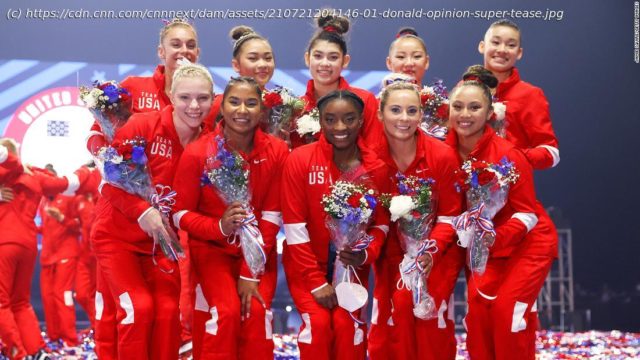Ella Donald writes that six years after Simone Biles gave up her scholarship to UCLA and turned professional, this year’s US women’s Olympic gymnastics team will include athletes who — thanks to recent rules changes from the NCAA — won’t have to choose between collegiate competition and compensation.
For any aspiring elite gymnast, the Olympics are still everything. But up until these Games the definition of « everything » also included the pressure to turn professional, to capitalize as much as possible on the potential for money-making endorsements or other deals. For athletes whose careers are so front-loaded into their youth, these financial concerns — along with draconian rules forbidding making money while participating in collegiate sport (thereby removing college as an option for many) — the Olympics were the primary, and often the last, stage where fans could watch their favorite US gymnasts launch themselves into history. However, thanks to a range of recent developments, this is far from the last time most of the gymnasts on this year’s team will compete. Recent changes by the NCAA allow student-athletes to profit off their name, image and likeness — think public appearances and merchandise, not competitions with prize money — is ushering in a new, exciting era of the sport. Before, top athletes had to choose between competition and cash. Now, when the gymnastics competition begins in Tokyo, it will be unlike ever before. Not only will it include a team of women 18 and older in a sport known traditionally for pixie teens, but it will also feature star gymnasts whose talents will later grace the stage (or mat) at US colleges, even if they still aspire to and plan to shoot for future Olympic greatness in — or profit from — their sport. Six years ago, this reality was still far away. In July 2015, almost a year before the Rio de Janeiro Olympics, Biles, then 18, did something that seemed inevitable. In a news release, she announced that she would forgo her scholarship to UCLA, turning professional and signing with an agent. She did this so that she could take for-pay competitive and promotional opportunities that would be simply be unavailable to her, were she to be competing at the collegiate level. « While I am grateful for the opportunity to compete collegiately, I feel that the chance to make my dream come true is right in front of me, » Biles said. « In order for me to be the best gymnast I can possibly be, I want to be sure that I have the necessary support and guidance in handling opportunities and demands outside of the gym. I know there are no guarantees, but I am excited and determined to be a member of Team USA at the 2016 Olympics. » Biles’ decision seemed like a foregone conclusion back then because women’s gymnastics has long occupied a unique position among other popular Olympic sports in the United States and internationally. In other Olympic sports in the US — including track and swimming — many Olympians have honed their skills through their collegiate careers before continuing their success through professional careers in their twenties (or even thirties, like Olympic trials silver medalist marathon runner Sally Kipyego), with opportunities to be compensated for their talents.






![Bartłomiej Sienkiewicz w "Graffiti" [OGLĄDAJ]](http://nhub.news/wp-content/uploads/2024/06/thumbcf7f4a607db3922a512eb9e3bad01f7f-100x75.jpeg)